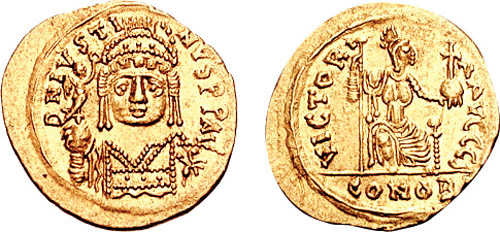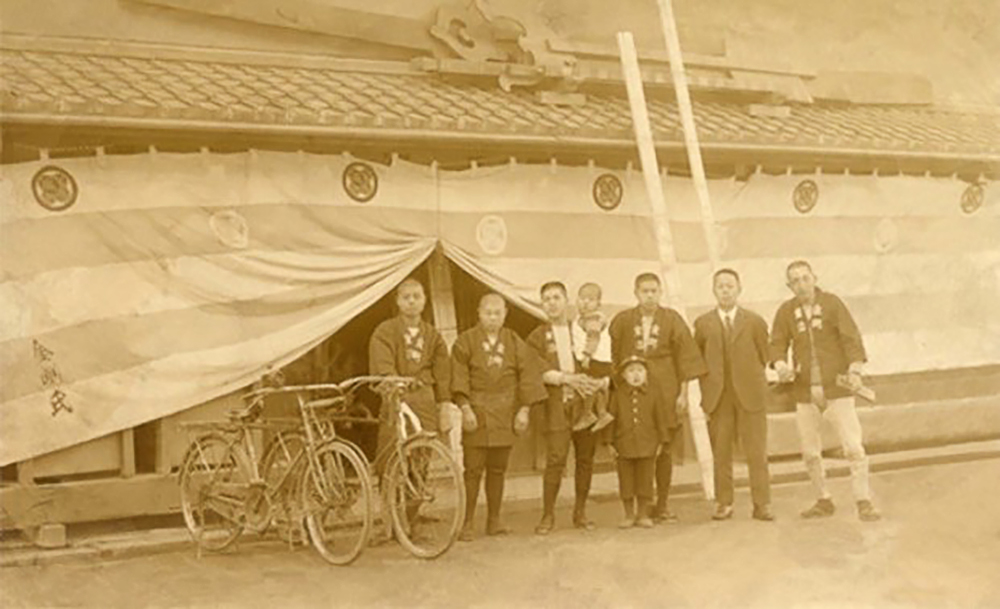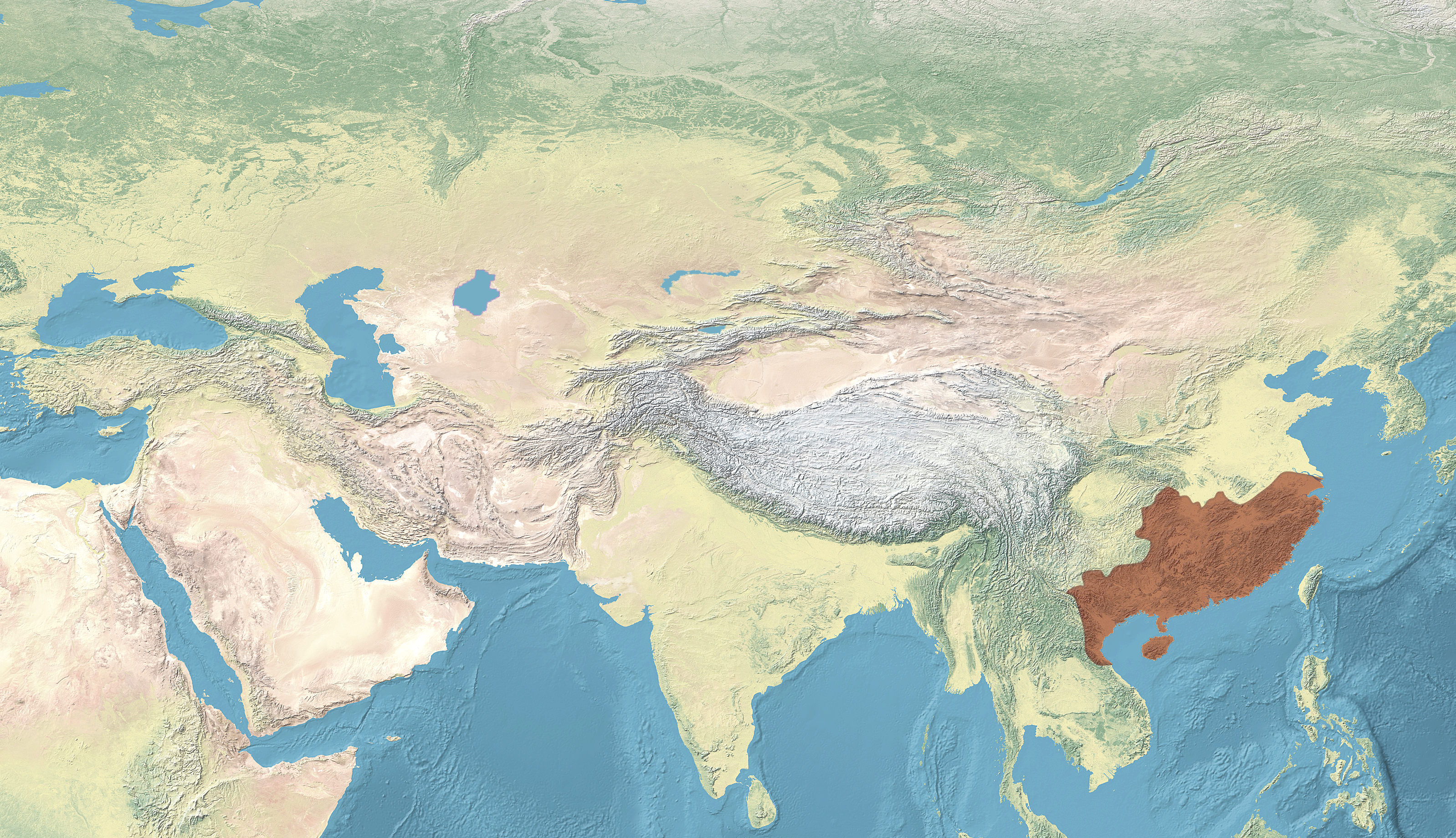|
578
__NOTOC__ Year 578 ( DLXXVIII) was a common year starting on Saturday of the Julian calendar. The denomination 578 for this year has been used since the early medieval period, when the Anno Domini calendar era became the prevalent method in Europe for naming years. Events By place Byzantine Empire * Byzantine–Sassanid War: A Byzantine army under command of Maurice (''magister militum per Orientem'') invades Upper Mesopotamia, and raids on both sides of the Tigris. He deports 70,000 captives from Hyrcania to Cyprus, and installs military colonists to guard the strategic locations. * October 5 – Emperor Justin II dies after several periods of insanity. On the advice of his wife Sophia, he has raised his general Tiberius to the rank of co-emperor ('' Caesar''). From December 574 he has ruled jointly with Sophia, and now succeeds them as emperor of the Byzantine Empire. Asia * Summer – Emperor Wu Di engages in military campaigns on two fronts: agai ... [...More Info...] [...Related Items...] OR: [Wikipedia] [Google] [Baidu] |
Tiberius II Constantine
Tiberius II Constantine (; ; died 14 August 582) was Eastern Roman emperor from 574 to 582. Tiberius rose to power in 574 when Justin II, prior to a mental breakdown, proclaimed him ''caesar'' and adopted him as his own son. In 578, the dying Justin II gave him the title of ''augustus'', thus becoming co-emperor alongside him. Tiberius became sole ruler less than two weeks later, assuming the regnal name of "Constantine" under which he reigned until his death. Early career Born in Thrace in the mid-6th century, Tiberius was appointed to the post of notarius. There, sometime after 552, he was introduced by the Patriarch Eutychius to the future emperor, Justin II, with whom he became firm friends. Under Justin's patronage, Tiberius was promoted to the position of '' Comes excubitorum'', which he held from approximately 565 through to 574. He was present during Justin's imperial accession on 14 November 565 and also attended his inauguration as consul on 1 January 566. Just ... [...More Info...] [...Related Items...] OR: [Wikipedia] [Google] [Baidu] |
Justin II
Justin II (; ; died 5 October 578) was Eastern Roman emperor from 565 until 578. He was the nephew of Justinian I and the husband of Sophia, the niece of Justinian's wife Theodora. Justin II inherited a greatly enlarged but overextended empire, with far fewer resources at his disposal compared to Justinian I. He ended the payment of tributes and adopted a hardline stance against the empire's neighbors, which resulted in rekindling of war with the Sassanid Empire, and in a Lombard invasion which cost the Romans much of their territory in Italy. Family He was a son of Vigilantia and Dulcidio (sometimes rendered as Dulcissimus), respectively the sister and brother-in-law of Justinian. His siblings included Marcellus and Praejecta. With Sophia he had a daughter Arabia and possibly a son, Justus, who died young. He also had a niece named Helena. Early life Justin's early years are largely obscure. A thirteenth-century chronicle suggests 511 as Justin's birth date, but its re ... [...More Info...] [...Related Items...] OR: [Wikipedia] [Google] [Baidu] |
Northern Zhou
Zhou (), known in historiography as the Northern Zhou (), was a Xianbei-led Dynasties in Chinese history, dynasty of China that lasted from 557 to 581. One of the Northern and Southern dynasties#Northern dynasties, Northern dynasties of China's Northern and Southern dynasties period, it succeeded the Western Wei, Western Wei dynasty and was eventually overthrown by the Sui dynasty. History The Northern Zhou's basis of power was established by Yuwen Tai, who was paramount general of Western Wei, following the split of Northern Wei into Western Wei and Eastern Wei in 535. After Yuwen Tai's death in 556, Yuwen Tai's nephew Yuwen Hu forced Emperor Gong of Western Wei to yield the throne to Yuwen Tai's son Emperor Xiaomin of Northern Zhou, Yuwen Jue (Emperor Xiaomin), establishing Northern Zhou. The reigns of the first three emperors (Yuwen Tai's sons) Emperor Xiaomin, Emperor Ming of Northern Zhou, Emperor Ming, and Emperor Wu of Northern Zhou, Emperor Wu were dominated by Yuwen Hu, ... [...More Info...] [...Related Items...] OR: [Wikipedia] [Google] [Baidu] |
Sophia (empress)
Aelia Sophia (Greek: Σοφία) (c. 530 – c./aft. 601) was Byzantine empress as the wife of Emperor Justin II. Sophia participated in the governance of the empire; she took an interest in the financial and foreign policies, and served as regent alongside Tiberius II during Justin's incapacity from 573 until 578. Early life According to the ''Ecclesiastical History'' of John of Ephesus and the ''Chronicle'' of Victor of Tunnuna, Sophia was a niece of Theodora, Lynda Garland"Sophia, Wife of Justin II"/ref> the Empress consort of Justinian I. John of Ephesus did not specify the identities of her parents. According to the ''Secret History'' of Procopius, Theodora had only two siblings: her older sister Comito and younger sister Anastasia; either one could be the mother of Sophia. Procopius identifies Comito as a leading hetaera of her age. John Malalas records that Comito (b. ca 500) married general Sittas in 528. Sittas may thus be the father of Sophia. Whether Anastasia ... [...More Info...] [...Related Items...] OR: [Wikipedia] [Google] [Baidu] |
Kongō Gumi
is a Japanese construction company, purportedly founded in 578 A.D., making it the List of oldest companies, world's oldest documented company. The company mainly works on the design, construction, restoration, and repair of shrines, temples, castles, and cultural heritage buildings. While Kongō Gumi historically specialized in traditional architecture, increased competition from major construction companies due to the growing use of concrete in shrines and temples resulted in the company becoming a subsidiary of the Takamatsu Construction Group in January 2006. History Headquartered in Osaka, Kongō Gumi was a family-owned construction company for over 1,400 years. A 17th century scroll traces the 40 generations back to the company's start. It has continued operation through the founder's descendants. As with many distinguished Japanese families, sons-in-law often joined the clan and took the Kongō family name. This allowed the company to continue with the same name when ... [...More Info...] [...Related Items...] OR: [Wikipedia] [Google] [Baidu] |
Emperor Xuan Of Northern Zhou
Emperor Xuan of Northern Zhou (北周宣帝) (559 – 22 June 580), personal name Yuwen Yun (宇文贇), courtesy name Qianbo (乾伯), was an emperor of the Xianbei-led Northern Zhou dynasty of China. He was known in history as an erratic and wasteful ruler, whose actions greatly weakened the Northern Zhou regime. As part of that erratic behavior, he passed the throne to his son Emperor Jing in April 579, less than a year after taking the throne, and subsequently entitled not only his wife Yang Lihua empress, but four additional concubines as empresses. After his death in June 580, the government was taken over by his father-in-law Yang Jian, who soon deposed his son Emperor Jing, ending the Northern Zhou and establishing the Sui dynasty. Background Yuwen Yun was born in 559, as the oldest son of Yuwen Yong, then the Duke of Lu and younger brother of Emperor Ming. He was born at Tong Province (同州, roughly modern Weinan, Shaanxi), as Yuwen Yong was at that time the gover ... [...More Info...] [...Related Items...] OR: [Wikipedia] [Google] [Baidu] |
Byzantine Empire
The Byzantine Empire, also known as the Eastern Roman Empire, was the continuation of the Roman Empire centred on Constantinople during late antiquity and the Middle Ages. Having survived History of the Roman Empire, the events that caused the fall of the Western Roman Empire in the 5th centuryAD, it endured until the fall of Constantinople to the Ottoman Empire in 1453. The term 'Byzantine Empire' was coined only after its demise; its citizens used the term 'Roman Empire' and called themselves 'Romans'. During the early centuries of the Roman Empire, the western provinces were Romanization (cultural), Latinised, but the eastern parts kept their Hellenistic culture. Constantine the Great, Constantine I () legalised Christianity and moved the capital to Constantinople. Theodosius I, Theodosius I () made Christianity the state religion and Greek gradually replaced Latin for official use. The empire adopted a defensive strategy and, throughout its remaining history, expe ... [...More Info...] [...Related Items...] OR: [Wikipedia] [Google] [Baidu] |
Cyprus
Cyprus (), officially the Republic of Cyprus, is an island country in the eastern Mediterranean Sea. Situated in West Asia, its cultural identity and geopolitical orientation are overwhelmingly Southeast European. Cyprus is the List of islands in the Mediterranean, third largest and third most populous island in the Mediterranean, after Sicily and Sardinia. It is located southeast of Greece, south of Turkey, west of Syria and Lebanon, northwest of Israel and Palestine, and north of Egypt. Its capital and largest city is Nicosia. Cyprus hosts the British Overseas Territories, British military bases Akrotiri and Dhekelia, whilst the northeast portion of the island is ''de facto'' governed by the self-declared Northern Cyprus, Turkish Republic of Northern Cyprus, which is separated from the Republic of Cyprus by the United Nations Buffer Zone in Cyprus, United Nations Buffer Zone. Cyprus was first settled by hunter-gatherers around 13,000 years ago, with farming communities em ... [...More Info...] [...Related Items...] OR: [Wikipedia] [Google] [Baidu] |
Chen Dynasty
The Chen dynasty (), alternatively known as the Southern Chen (南陳 / 南朝陳) in historiography, was a Dynasties in Chinese history, Chinese imperial dynasty and the fourth and last of the Northern and Southern dynasties#Southern dynasties, Southern dynasties during the Northern and Southern dynasties period. Following the Liang dynasty, the Chen dynasty was founded by Emperor Wu of Chen, Chen Baxian (Emperor Wu). The Chen dynasty further strengthened and revitalized the economy and culture of southern China, and made territorial expansions northward, laying the foundation for future dynasties. It was conquered by the Sui dynasty in 589, marking an end to the Northern and Southern dynasties period in Chinese history. The descendants of the Chen imperial family continued to hold powerful high-ranking positions in the imperial courts of both the Sui and Tang dynasty, Tang dynasties. History Founding and expansion: Chen Baxian In the twilight of the Liang dynasty (548–55 ... [...More Info...] [...Related Items...] OR: [Wikipedia] [Google] [Baidu] |
Japan
Japan is an island country in East Asia. Located in the Pacific Ocean off the northeast coast of the Asia, Asian mainland, it is bordered on the west by the Sea of Japan and extends from the Sea of Okhotsk in the north to the East China Sea in the south. The Japanese archipelago consists of four major islands—Hokkaido, Honshu, Shikoku, and Kyushu—and List of islands of Japan, thousands of smaller islands, covering . Japan has a population of over 123 million as of 2025, making it the List of countries and dependencies by population, eleventh-most populous country. The capital of Japan and List of cities in Japan, its largest city is Tokyo; the Greater Tokyo Area is the List of largest cities, largest metropolitan area in the world, with more than 37 million inhabitants as of 2024. Japan is divided into 47 Prefectures of Japan, administrative prefectures and List of regions of Japan, eight traditional regions. About three-quarters of Geography of Japan, the countr ... [...More Info...] [...Related Items...] OR: [Wikipedia] [Google] [Baidu] |
Caesar (title)
Caesar ( English language, English Caesars; Latin ; in Greek: ) is a title of imperial character. It derives from the ''cognomen'' of Julius Caesar. The change from being a surname to a title used by the Roman emperors can be traced to AD 68, following the fall of the Julio-Claudian dynasty. When used on its own, the title denoted heirs apparent, who would later adopt the title ''Augustus (title), Augustus'' on accession. The title remained an essential part of the style of the emperors, and became the word for "emperor" in some languages, such as German () and Slavic (). Origins The first known individual to bear the ''cognomen'' of "Caesar" was Sextus Julius Caesar (praetor 208 BC), Sextus Julius Caesar, who is likewise believed to be the common ancestor of all subsequent Julii Caesares. Sextus's great-grandson was the dictator Julius Caesar, Gaius Julius Caesar, who seized control of the Roman Republic following his Caesar's civil war, war against the Roman Senate ... [...More Info...] [...Related Items...] OR: [Wikipedia] [Google] [Baidu] |
October 5
Events Pre-1600 * 610 – Heraclius arrives at Constantinople, kills Byzantine Emperor Phocas, and becomes emperor. * 816 – King Louis the Pious is crowned emperor of the Holy Roman Empire by the Pope. * 869 – The Fourth Council of Constantinople is convened to depose patriarch Photios I. * 1143 – With the signing of the Treaty of Zamora, King Alfonso VII of León and Castile recognises Portugal as a Kingdom. * 1450 – Louis IX, Duke of Bavaria expels Jews from his jurisdiction. 1601–1900 * 1607 – Assassins attempt to kill Venetian statesman and scientist Paolo Sarpi. *1789 – French Revolution: The Women's March on Versailles effectively terminates royal authority. * 1813 – War of 1812: The Army of the Northwest defeats a British and Native Canadian force threatening Detroit. * 1838 – The Killough massacre in east Texas sees eighteen Texian settlers either killed or kidnapped. * 1869 – The Saxby Gale devastat ... [...More Info...] [...Related Items...] OR: [Wikipedia] [Google] [Baidu] |









